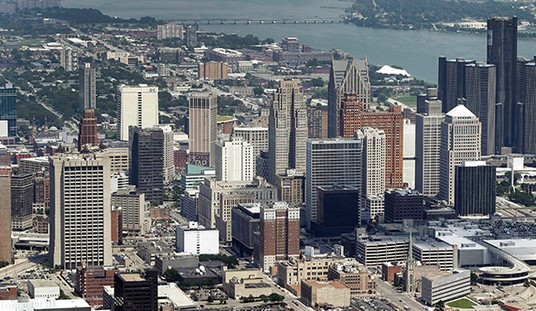The dreams of the climate scolds sure seem to be fading away. The Net Zero goal is a set of mobile goalposts that just keeps getting pushed farther and farther away; the predominant goal for much of the developed world has been, for some time now, to achieve Net Zero by around 2050. This was never a reasonable goal, always would have had detrimental effects on our way of life, and now even the climate-change panic-mongers are having to admit that it's not realistic.
This is good news; a return to objective reality always is. For the time being, gas, oil, and coal will continue to power much of the developed and developing world, and it will be gas, oil, and coal that will bring reliable, affordable electricity to millions in places like sub-Saharan Africa, who do not have that electricity now. As for the future? The future of energy isn't solar panels or windmills; it's nuclear power.
There's an outfit called McKinsey & Company, a global outfit that produces an annual report called the Global Energy Perspective. What it has to say about the goals of the Net Zero movement and its adherents is worth reading.
Two overarching themes emerge from this year’s outlook. First, cost competitiveness and an economically pragmatic energy transition remain paramount. Energy affordability, reliability (including energy security at the national or regional level), and emission reduction continue to form a trio of priorities that drive energy decision-making. However, without affordability—along with bankability—widespread adoption of new low-carbon technologies will not happen.
Second, there is no silver bullet for decarbonization. Countries and regions will follow distinct trajectories based on local economic conditions, resource endowment, and the realities facing particular industries.
These aren't bad points. Affordability, though, is the key one - as is the admission, in other words, of something I've been saying for years: We solve today's problems with tomorrow's technology.
Yet every year also brings unforeseen developments, whether breakthroughs in energy technology that allow accelerated scale-up of solar and wind power or innovations like AI that drive rapid growth in power demand.
There will be breakthroughs in energy technology; that's for sure and for certain. But the laws of physics and the problem of energy density mandate that these breakthroughs won't come from solar or wind power, especially when we take into account the heavy energy demand of new things like AI. No, the next big breakthrough, the next society-changing technology, will almost certainly be workable fusion power - and that's a ways off yet.
Read More: New York's Green Energy Mandates Are Hitting the Wall
Autopsy of a Subsidy Zombie: How Sunnova Burned Billions and Collapsed
2050, remember, is that key date:
Fossil fuels are projected to retain a large share of the energy mix beyond 2050
Demand will likely plateau between 2030 and 2035 in the Continued Momentum scenario.
Natural gas, which will see growth in use for electricity generation, as well as for final consumption, could see the strongest demand increase, displacing higher-emission fuels in many cases. Coal use may also persist at higher levels than seen in previous McKinsey outlooks, depending on the scenario.
Over at the Daily Caller, Science and Research Associate at the CO2 Coalition Vijay Jayaraj has some thoughts on all this:
In any case, McKinsey’s report confirms what seasoned energy analysts and pragmatic policymakers have long maintained: The energy transition will not be swift, simple, or governed solely by climate targets. In fact, this energy transition will not happen at all without large scale deployment of nuclear, geothermal or other technological innovations that prove practical.
Note the lack of solar or wind-power options. These are increasingly being abandoned as expensive and impractical. In Germany, which has gone heavily into wind and solar power, the unreliability of those technologies has actually caused the Germans to coin a new word for those dark, windless days when energy generation drops to near-zero: Dunkelflaute, or "dark doldrums." The developing nations, including India and China, are adhering to no such illusions. Oh, they pay lip service to alternative energy sources, but their primary investments are going into coal, gas, and oil.
In places such as India, Southeast Asia and sub-Saharan Africa, the top energy priorities are access, affordability and reliability, which together add up to national security. Planners are acutely aware of a trap: Sole reliance on weather-dependent power risks blackouts, industrial disruption, economic decline and civil unrest.
That is why many developing nations are embracing a dual track: continued investment in conventional generation (coal, gas, nuclear) while developing alternative technologies. McKinsey says this in consultancy lingo: “Countries and regions will follow distinct trajectories based on local economic conditions, resource endowment, and the realities facing particular industries.”
In other words, people will do what pays. Solar, wind, and other "green" boondoggles don't produce a return on investment. Coal, oil, and gas do. That's what the developing world needs.
While all this return to sanity is revealing, we should note that this insistence on green energy boondoggles in the poorest countries in the world is the really infuriating part of this debate. Well-meaning yet fuzzy-headed Americans and Europeans seem to look at places like much of sub-Saharan Africa as their laboratories for social issues; they claim that wind and solar can power the poorest people in the world to prosperity. Horse squeeze! What these people need above all else, the one thing that will jump-start their development out of grinding, abject poverty and help them join the modern world, is cheap, reliable electricity. Coal, gas, and oil can provide that. In time, nuclear power will be a source, as well. But solar and wind will never make it; people pushing for this want to sentence the poverty-stricken, like the Germans, to a never-ending cycle of Dunkelflaute.
There is, though, now some light at the end of this climate-panic tunnel. Even former proponents of Net Zero are admitting its flaws - I'm looking at you, Bill Gates - and ongoing development of more and more traditional resources, especially right here in the United States, will only make those traditional sources more affordable still.
And who knows? Maybe one of these years, someone will figure out how to make a working, grid-scale fusion reactor.
Greta Thunberg was unavailable for comment.















